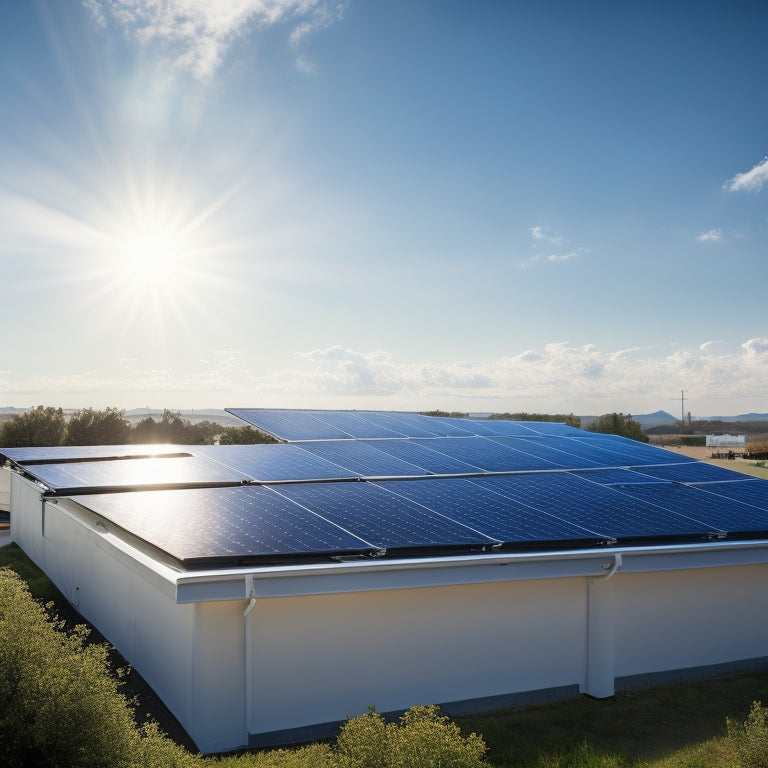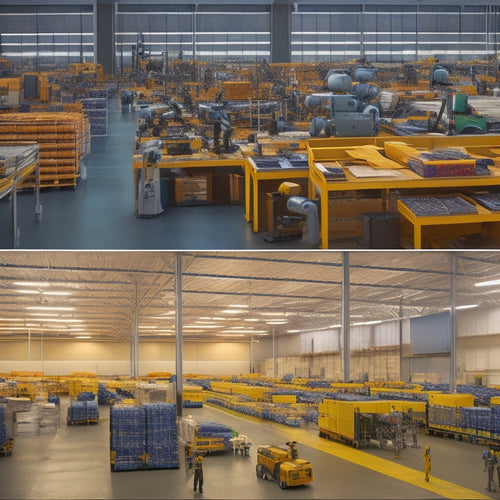
Top-Rated Solar Panel Systems: Expert Reviews Revealed
Share
You're looking for top-rated solar panel systems that offer maximum energy efficiency, durability, and aesthetic appeal for your home. You're in luck! Expert reviews reveal that high-efficiency panels with advanced design and materials offer greater energy yield and savings. You'll want to take into account factors like certifications, warranties, and maintenance when selecting a system. In addition, inverters with Maximum Power Point Tracking and high-efficiency chargers can optimize energy harvesting. As you explore your options, you'll find that customization, referrals, and group purchasing can reduce upfront costs and enhance overall performance. Now, discover the top solar panel brands and systems that can bring sustainable energy to your doorstep.
Key Takeaways
• Top-rated solar panel systems prioritize efficiency, durability, and aesthetics, with innovations like bifacial panels and integrated inverters.
• Residential solar panels offer long-term savings, with considerations like roof size and home style impacting panel selection and certification.
• High-efficiency panels maximize energy output, with advanced design, materials, and manufacturing techniques ensuring greater energy yield and savings.
• Inverter technology, such as Maximum Power Point Tracking (MPPT), optimizes energy harvesting and power output, enhancing energy efficiency and performance.
• Compatibility and integration of inverters, chargers, and energy storage systems are crucial for optimal performance, reliability, and overall system efficiency.
Top Solar Panel Brands Compared
When selecting a solar panel system, comparing top brands is essential to make sure you find the best fit for your energy needs and budget. You want a system that provides maximum energy output, durability, and value for your investment.
To make an informed decision, it's important to stay up-to-date on market trends and industry insights. Currently, the solar industry is experiencing rapid growth, driven by declining costs and increasing demand for renewable energy. As a result, top brands are innovating and expanding their product offerings to meet the rising demand.
According to industry insights, the top solar panel brands are focusing on improving efficiency, durability, and aesthetics. You can expect to see advancements in bifacial panels, half-cut cells, and integrated inverters.
Residential Solar Panels Reviewed
As you explore residential solar panels, you'll encounter various options to evaluate.
You'll want to assess the energy efficiency ratings of different panels, as even small differences can impact your energy savings over time.
Residential Panel Options
You'll find a wide range of residential solar panel options on the market, each with its unique features, benefits, and drawbacks, making it essential to carefully evaluate them before making a purchasing decision.
When selecting the right residential solar panel option for your home, consider your roof size and home style. A larger roof provides more space for solar panels, allowing you to generate more power. On the other hand, a smaller roof may require more efficient panels to maximize energy production.
Additionally, your home style can affect the type of solar panels you choose. For instance, if you have a modern home with a sleek design, you may prefer sleek and compact solar panels that blend seamlessly with your roof.
Some residential solar panels are designed specifically for certain roof types, such as metal or tile roofs. Others are more versatile and can be installed on various roof types. Be sure to research and compare different options to find the one that best fits your energy needs and budget.
Energy Efficiency Ratings
Your solar panel system's energy efficiency rating greatly impacts the amount of power it can generate, and understanding these ratings is vital to making an informed purchase decision.
When evaluating residential solar panels, you'll come across various energy efficiency ratings, which can be overwhelming. To simplify the process, look for certifications from reputable organizations, such as the International Electrotechnical Commission (IEC) or the Underwriters Laboratories (UL). These organizations set renewable standards for energy efficiency, ensuring that solar panels meet certain criteria.
Energy certifications, like the IEC 61215, verify that your solar panels meet specific performance and safety standards. A higher energy efficiency rating indicates that your solar panel system can generate more power per hour of sunlight.
When comparing different solar panel options, pay attention to the efficiency rating, as it directly affects your system's overall performance. By understanding energy efficiency ratings and certifications, you'll be able to make an informed decision when selecting the best solar panel system for your residential needs.
Best Value for Homeowners Found
After reviewing numerous solar panel systems, homeowners can now reap the benefits of renewable energy at an affordable price point, thanks to the emergence of high-efficiency options that balance quality and cost-effectiveness.
You, as a homeowner, can now enjoy substantial solar savings while reducing your carbon footprint.
When it comes to finding the best value for your money, consider the following key factors:
-
Homeowner incentives: Look for systems that offer attractive rebates and tax credits, which can greatly reduce your upfront costs.
-
Efficiency ratings: Opt for systems with high-efficiency panels that can generate more power per hour of sunlight, resulting in increased solar savings.
-
Warranty and maintenance: Choose systems with extensive warranties and low maintenance requirements to ensure minimal downtime and repair costs.
High-Efficiency Panels Rated Highest
In addition, high-efficiency solar panels, boasting conversion rates of 20% or higher, have consistently topped the charts in expert reviews, surpassing their lower-efficiency counterparts when it comes to energy yield and overall value.
You're likely wondering what sets these high-efficiency panels apart from the rest. The secret lies in advanced solar panel design, which enables more efficient energy harvesting. By utilizing cutting-edge materials and innovative manufacturing techniques, high-efficiency panels can squeeze more power out of every sunbeam that hits them.
This means you'll generate more electricity per hour of sunlight, resulting in greater savings on your energy bills. Moreover, high-efficiency panels tend to be more compact, allowing you to maximize your energy output even in limited spaces.
When it comes to getting the most bang for your buck, high-efficiency solar panels are the clear winner. By investing in these top-rated panels, you'll be harnessing the full potential of solar energy to power your home or business.
Solar Energy Systems for Homes
When considering solar energy systems for your home, you'll want to explore residential solar options that cater to your specific needs and budget.
You'll also want to assess opportunities for energy efficiency upgrades, which can maximize the benefits of your solar investment.
Residential Solar Options
Your shift to renewable energy starts with understanding residential solar options, which can greatly reduce your reliance on the grid and lower your energy bills. As you explore your options, consider the following key factors:
-
Solar Neighbors:
Take a cue from your neighbors who've already made the switch to solar. You can learn from their experiences, get referrals, and even explore group purchasing options. -
Home Decorations:
Solar panels can be designed to blend seamlessly with your home's aesthetic. Choose from a range of styles, colors, and mounting options to guarantee a sleek, integrated look. -
System Size and Configuration:
Determine the best system size and configuration for your energy needs, roof size, and local building codes.
Energy Efficiency Upgrades
You can greatly enhance the energy efficiency of your home by integrating solar energy systems with complementary upgrades, such as advanced insulation, energy-efficient appliances, and smart home systems. These upgrades not only reduce your carbon footprint but also increase the overall value of your property. By investing in green remodeling, you can create a more sustainable living space that's both eco-friendly and cost-effective.
Smart homes, for instance, can be equipped with advanced sensors and automation systems that optimize energy consumption and reduce waste.
Energy-efficient appliances, on the other hand, can markedly lower your energy bills and minimize your environmental impact.
Additionally, advanced insulation can help reduce heat loss and keep your home warm during the winter months.
Top-Rated Inverters and Chargers
High-efficiency inverters and chargers are essential components of a solar panel system, as they convert DC power from the solar panels into AC power for your home or business. When selecting an inverter and charger, it's important to take into account factors such as efficiency, reliability, and compatibility with your solar panel system.
Here are three key considerations when evaluating top-rated inverters and chargers:
-
Inverter Technology: Look for inverters with advanced technology, such as Maximum Power Point Tracking (MPPT), which optimizes energy harvesting and maximizes power output.
-
Charger Efficiency: Choose chargers with high efficiency ratings (>95%) to minimize energy losses and reduce your carbon footprint.
-
Compatibility and Integration: Make sure the inverter and charger are compatible with your solar panel system and can seamlessly integrate with other components, such as energy storage systems.
Expert Reviews of Solar Batteries
As you explore the world of solar batteries, you'll encounter various types, each with its strengths and weaknesses.
You'll want to understand the key differences between lead-acid, lithium-ion, and other battery types to determine which one best fits your energy storage needs.
Battery Types Compared
When selecting a solar battery, understanding the differences between various types is essential, as each offers distinct advantages and disadvantages regarding cost, efficiency, and lifespan.
As you explore your options, you'll likely come across three primary types of solar batteries: Deep Cycle, Lithium-Ion, and Lead-Acid. Here's a brief rundown of each:
-
Deep Cycle: Designed for frequent charging and discharging, these batteries are ideal for off-grid systems. They're more expensive, but offer a longer lifespan (up to 15 years) and require minimal maintenance.
-
Lithium-Ion: These batteries boast high energy density, long lifetimes (up to 20 years), and low maintenance needs. However, they're more expensive than Lead-Acid batteries and can be sensitive to temperature fluctuations.
-
Lead-Acid: The most affordable option, Lead-Acid batteries are suitable for small-scale systems. They have a shorter lifespan (around 5-7 years) and require regular maintenance to ensure peak performance.
When choosing a solar battery, consider factors like your energy needs, budget, and desired level of maintenance. By understanding the strengths and weaknesses of each type, you can make an informed decision that meets your unique requirements.
Energy Storage Capacity
Your energy storage needs will dictate the capacity of the solar battery you require, and understanding the various capacities available is vital to making sure you can meet your energy demands. When selecting a solar battery, you'll need to take into account the capacity that suits your energy needs.
Typical capacities range from 2-12 kilowatt-hours (kWh), with some systems offering up to 20 kWh or more.
For homeowners seeking grid resilience, a higher capacity battery (10-15 kWh) can provide backup power during extended power outages. For those with smaller energy needs, a lower capacity battery (2-5 kWh) may suffice. It's important to assess your energy usage patterns, including peak demand periods, to determine the ideal capacity for your solar battery.
When evaluating energy storage capacity, consider factors like your home's energy efficiency, appliance usage, and the number of days you want to maintain backup power during an outage. By choosing the right capacity, you'll be able to store excess energy generated by your solar panels and guarantee a reliable supply of power when you need it most.
Comparison of Installation Methods
You're faced with two primary installation methods when deciding how to integrate solar panels into your home's electrical system: roof-mounted and ground-mounted systems. These two options differ greatly in terms of installation, maintenance, and overall aesthetic appeal.
When considering roof-mounted systems, you'll need to prioritize Roof Preparation to make sure a secure and watertight seal. This involves inspecting your roof's condition, replacing old or damaged shingles, and ensuring a sturdy surface for the solar panels.
On the other hand, Ground Mounting systems offer more flexibility regarding panel orientation and placement. Here are three key benefits to take into account:
-
Increased energy output: Ground-mounted systems can be positioned for maximum energy absorption, leading to higher energy yields.
-
Easier maintenance: With easier access to the panels, cleaning and maintenance become less of a hassle.
-
Enhanced customization: Ground-mounted systems can be designed to accommodate unique terrain or obstructions on your property.
Ultimately, the choice between roof-mounted and ground-mounted systems depends on your specific energy needs, roof condition, and personal preferences.
Top Solar Panel Warranties Reviewed
What sets top-tier solar panel manufacturers apart is their dedication to backing their products with extensive warranties that safeguard your investment. When you invest in a solar panel system, you want assurance that it will perform at its best for years to come. That's where a thorough warranty comes in.
Industry standards dictate that reputable manufacturers provide a minimum 25-year warranty on their solar panels. However, some top brands offer even more extensive coverage, including 30-year or even lifetime warranties.
When reviewing warranties, it's important to understand what's covered and what's not. Warranty Exclusions, such as damage caused by natural disasters or improper installation, can have a significant impact on the effectiveness of your warranty. Be sure to carefully review the fine print to ensure you understand what's protected and what's not.
Best Solar Panel Systems Overall
When evaluating the best solar panel systems overall, manufacturers' performance, durability, and warranty offerings are key aspects to take into account, as they directly impact the system's efficiency, reliability, and long-term value. As you navigate the solar industry, it's important to consider the top performers that will help you achieve a renewable future.
Here are the top three solar panel systems that stand out from the rest:
-
Tesla Solar Roof: Known for its sleek design and impressive energy output, Tesla's solar roof system is a top contender in the industry.
-
SunPower X-Series Residential Solar Panels: With its high-efficiency cells and 25-year warranty, SunPower's X-Series is a reliable choice for homeowners.
-
Panasonic HIT-240 Solar Panel: Offering high energy output and a 25-year warranty, Panasonic's HIT-240 is a popular choice for those seeking a reliable and efficient system.
When selecting a solar panel system, it's important to take into account factors such as energy output, durability, and warranty offerings. By choosing a top-rated system, you'll be well on your way to harnessing the power of renewable energy and achieving a sustainable future.
Frequently Asked Questions
Can I Install Solar Panels on a Metal or Clay Tile Roof?
You can install solar panels on a metal or clay tile roof, but guarantee roof durability by checking the tile's compatibility and weight capacity, and consider consulting a professional for a secure installation.
Are Solar Panels Affected by Shade From Trees or Buildings?
'Imagine your solar panels as a thirsty plant, withering in the shade. You'll want to prune the shadowy obstacles, like tree branches, and conduct a thorough shadow analysis to guarantee maximum energy harvest, as even slight shading can significantly impact your system's performance.'
Do Solar Panels Work During Power Outages or at Night?
You'll be glad to know that solar panels don't generate power during outages or at night, but with energy storage solutions, you can maintain grid resiliency, ensuring a reliable energy supply even when the grid is down.
How Often Should I Clean My Solar Panels to Maintain Efficiency?
'As you navigate the Renaissance of renewable energy, don't overlook the importance of regular cleaning. You should clean your solar panels every 6-12 months to mitigate dust accumulation and prevent panel degradation, ensuring peak energy harvesting.'
Can I Add Solar Panels to an Existing Electrical System?
You can add solar panels to an existing electrical system, but it may require system integration and electrical upgrades to guarantee a safe and efficient connection, so consult a licensed electrician to assess your setup.
Related Posts
-

Charging On-The-Go: Portable Battery Solutions Online
You're always on the move, and your devices need to keep up - that's why having a reliable portable battery solution ...
-

Why Are Online Prices for Panels So Low?
When you buy panels online, you're often taking advantage of a combination of factors that drive prices lower. You're...
-

Why Go Solo in Urban Transportation?
You're taking control of your daily commute by ditching the crowds and going solo, and that's a smart move. By choosi...


